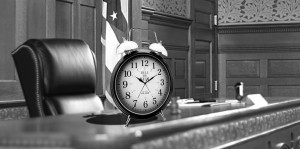NYCPL 30.30 Who Gets Charged Speedy Trial Time ? What Every Defense Lawyer Should Know.
People v Barden
New York Court of Appeals
2016 NY Slip Op 04659
Decided: June 14, 2016
Issue: Who is chargeable for statutory speedy trial purposes, with each discrete time period within pre-readiness adjournment when the People initially request an adjournment to a specific date, defense counsel is unavailable on that date and requests a later date, but the court is unavailable on the later date, resulting in an even longer adjournment.
What portion of each adjournment period is chargeable to each party when, as here, both the People and defendant seek additional time?
Holding: The Court of Appeals held that defendant did not consent to the additional delay attributable to court congestion and, because the People failed to announce readiness within the statutory time period, defendant was entitled to dismissal of the indictment on speedy trial grounds.
Facts: Defendant was indicted on charges of identity theft, criminal possession of stolen property and two counts of theft of services. At several court appearances, the People stated that they were not ready for trial and requested adjournments. During some of those appearances, defense counsel asked for additional time beyond the dates requested by the People. Defendant subsequently moved to dismiss the indictment based on, among other things, a violation of his statutory speedy trial rights.
Supreme Court denied defendant’s motion without explanation, implicitly charging the People with only the time actually requested by them and excluding additional time resulting from defense counsel’s other obligations and court congestion. Ultimately, the People did not announce their readiness until the day of trial, more than 16 months after commencement of the criminal action.
After a jury trial, defendant was convicted as charged. The Appellate Division modified the judgment by dismissing the identity theft count, but otherwise affirmed (117 AD3d 216 [1st Dept. 2014).
A Judge of this Court granted defendant leave to appeal where the Court reversed the Appellate Divisions order and held that the Supreme Court erred when it failed to charge the People with the 16 extra days. which the court, itself, requested. Because those 16 days put the People over the statutory limit, defendant’s CPL 30.30 motion should have been granted and the indictment should have been dismissed.
 Legal Analysis: The Court of Appeals held that first they must decide whether defendant consented to the additional delay occasioned by the courts calendar when, upon being advised by the court of its next available date counsel had responded that it would be fine. The Court held, where a felony is included in an indictment, the People must be ready for trial within six months, after subtracting excludable time, CPL 30.30 [1] [a).
Legal Analysis: The Court of Appeals held that first they must decide whether defendant consented to the additional delay occasioned by the courts calendar when, upon being advised by the court of its next available date counsel had responded that it would be fine. The Court held, where a felony is included in an indictment, the People must be ready for trial within six months, after subtracting excludable time, CPL 30.30 [1] [a).
Once a defendant has shown the existence of an unexcused delay greater then six months, the burden of showing that time should be excluded falls upon the People, People v Santos, 68 NY2d 859, 861 [1986];?see People v Santana, 80 NY2d 92, 105 (1992). Under the relevant statute, a court can exclude the period of delay resulting from a continuance granted by the court at the request of, or with consent of, the defendant or his counsel, CPL 30.30 [4] [b];?see People v Worley, 66 NY2d 523, 527 [1985]).
On the other hand, pre-readiness delays arising from court congestion or court scheduling problems are chargeable to the People, because court delays do not prevent the People from being ready or declaring readiness in a written off-calendar statement, People v Chavis, 91 NY2d 500, 504 (1998);?People v Smith, 82 NY2d 676, 678 (1993);?People v Kendzia, 64 NY2d 331, 337-338 (1985);?People v Brothers, 50 NY2d 413, 417 1980). Indeed, when the People are not ready and request an adjournment, a later written “statement of readiness can save the People from liability for the remainder of the adjournment period, People v Stirrup, 91 NY2d 434, 436, 440 (1998). In this case, the statutory six-month period equated to 184 days. Without explanation, Supreme Court charged the People with 179 days; those days are not at issue on this appeal.
Rather, the question is whether, in calculating the number of days chargeable to the People, the motion court properly assigned partial responsibility to each of the parties for three adjournments granted between January 5, 2011 and April 13, 2011. In that regard, the parties primarily dispute the meaning of certain language in this Court’s decision in?People v Smith?(82 NY2d 676 1993), where the Court held that statements consented to by defense must be clearly expressed to relieve the people of the responsibility for that portion of the delay. Defense counsels failure to object to the adjournment or failure does not constitute consent.
The adjournments at issue here, were, in the first instance, precipitated by the Peoples failure to be ready for trial. Defense counsel never formally consented to the adjournments and did not participate in setting the adjourned dates. Because the actual dates were set either by the court or the prosecution, no justification exists for excluding the additional adjournment time required to accommodate defense counsels schedule.
What Constitutes Participation Sufficient To Establish A Request For, Or Consent To, An Adjournment By Defense Counsel.
As Smith states, counsels mere failure to object to an adjournment, or indication that a date requested by the People is inconvenient, is not a request or clear expression of consent for purposed of calculating excludable time under CPL 30.30. Here, defense counsel did more than merely state that she was unavailable on the dated requested by the People, therefore it is crucial to determine what portion of each adjournment period is chargeable to each party, when, both the People and the defendant seek additional time, CPL 30.30[4] [b]; People v Fuller, 8 AD3d 204, 205 [1st Dept. 2004], lv denied 3 NY3d 706 (2014).
When the People requested an adjournment, defense counsel asked for one the following week. At the same time, counsel stated that she needed an investigator for defendants case. The Court set a date one week later then that requested by the People. On defendant’s motion, the court charged the People with the dates they requested, but charged defendant with the days thereafter. In that instance, defense counsel indicated that she needed time to find an investigator. This request constituted a clear expression of consent to a longer adjournment than that sought by the people, rendering that time chargeable to defendant. Contrary to the Peoples argument, counsels accommodation of the courts schedule merely by failing to express an objection to the alternate date proposed by the court after it indicated that the date suggested by counsel was not available cannot, under CPL 30.30, be considered consent to the extension of the adjournment. This Court has held that adjournments consented to by the defense must be clearly expressed to relieve the People of the responsibility for that portion of the delay, Smith, 82 NY2d at 678.
People Bear The Burden Of Establishing Time
Additionally, as noted above, the People bear the burden of establishing which time periods should be excluded from the statutory six months, with no burden being placed on the defendant, Santana, 80 NY2d at 105; Santos, 68 NY2d at 861. The general rule that the People should be charged with pre-readiness delays caused by court congestion, Chavis, 91 NY2d at 504; Stirrup, 91 NY2d at 440; Smith, 82 NY2d at 678; Kendzia, 64 NY2d at 337-338; Brothers, 50 NY2d at 417 ?is premised on the idea that such delays do not inhibit the People from declaring readiness in writing, through an off-calendar statement, Smith, 82 NY2d at 678.
That reasoning applies equally well to any portion of a pre-readiness adjournment that is associated with court congestion, regardless of which party is chargeable with the remaining portion or portions of that adjournment. Here, the People could have filed an off-calendar statement of readiness at any time to stop the speedy trial clock, but they never did so. If the People were unsure of whether defense counsel’s statement was an indication of consent to the entire period of the adjournment, they could have asked for clarification on the record; again, the People did not do so.
Because the People did not meet their burden, Supreme Court erred to the extent it failed to charge the People with the 16 extra days from March 29 through April 13, which the court, itself, requested. Because those 16 days put the People over the statutory limit, defendant’s CPL 30.30 motion should have been granted and the indictment should have been dismissed.
The Court of Appeals held that the order of the Appellate Division should be reversed, and defendant’s CPL 30.30 motion granted.

